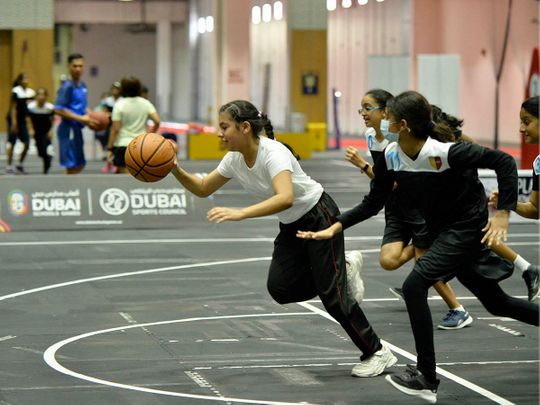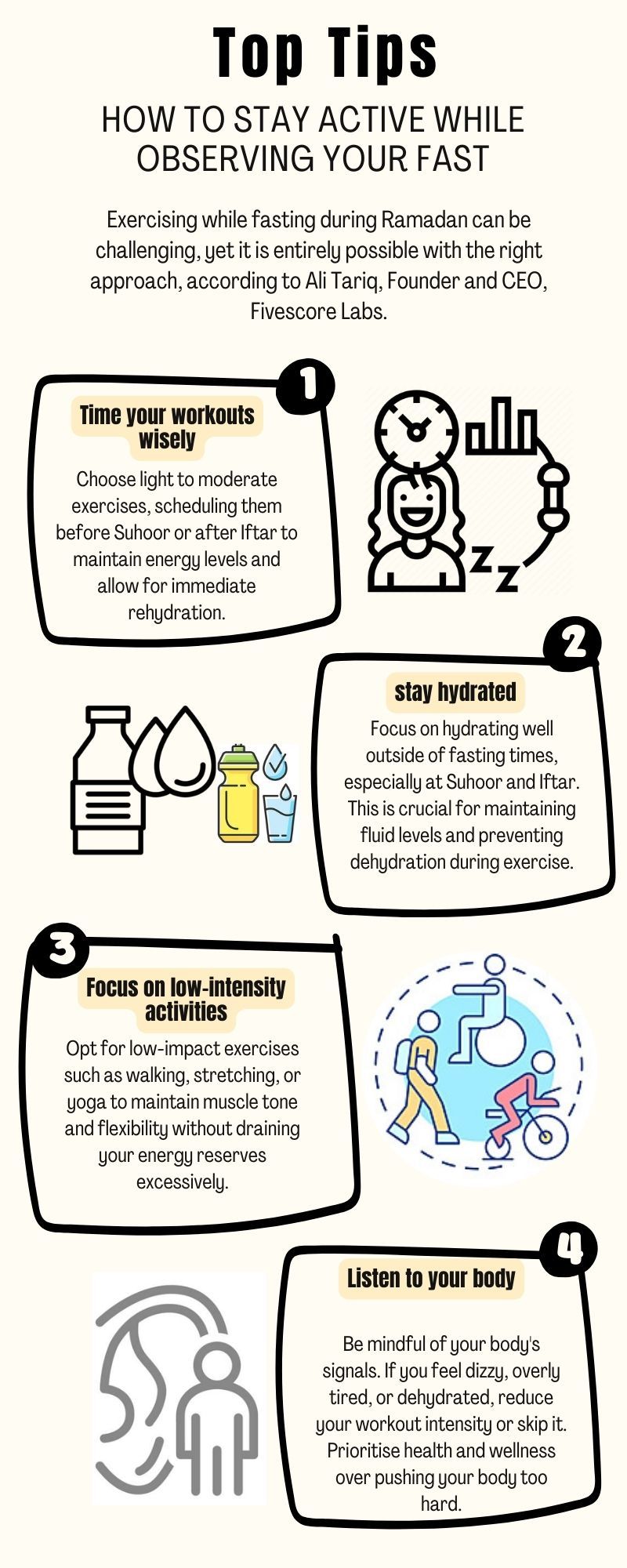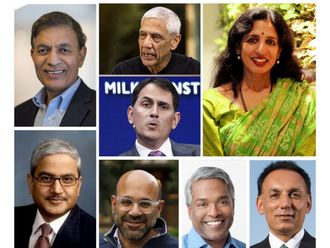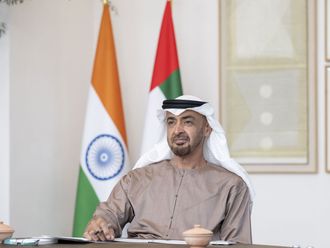
Is it OK to engage in intense physical exercise while fasting in Ramadan? Or should I tone down the intensity?
With the correct methodology or strategy, exercise during the fasting month is possible, say experts. Moreover, several studies suggest healthy individual can exercise during the fasting month, with some care and caution.
“Exercising while fasting during Ramadan can be challenging, yet it is entirely possible with the right approach,” said Ali Tariq, Founder and CEO, of Fivescore Labs, based in the UAE.
Fivescore Labs – co-founded by Harvard-trained scientists – claims to be the region’s first longevity consumer brand that aims to help people live healthier for longer, using science-backed treatment to boost metabolism and repair damaged DNA.

Fasting, especially during Ramadan, offers a unique opportunity to rejuvenate both mind and body, contributing to overall health and well-being.
Fasting has been part of human culture and religion for millennia, and is known to offer numerous health, wellness, and longevity benefits, Tariq said.
Study on exercise during Ramadan fasting
A 2023 study on health care professionals (ages from 31 to 40 years old), published in the November 2023 edition of the peer-reviewed Cureus Journal of Medical Science, tackled exercise while fasting during Ramadan.
The observational study involved 89 health care workers, of whom 36 are physicians, in Jeddah, Saudi Arabia.
It showed that one-third (33 per cent) who performed moderate or severe-intensity exercise, decreased their intensity to a low level during Ramadan. However, 10.8 per cent of respondents actually upgraded their exercise intensity from low to moderate – or “severe” levels during their Ramadan fasting.
The researchers concluded that fasting during Ramadan had no significant impact on the usual exercise rate of the respondents.

It plays a crucial role in cellular repair and longevity.
“This process not only aids in detoxification but also enhances the body’s resistance to stress and disease,” said Ali Tariq. “Thus, fasting, especially during Ramadan, offers a unique opportunity to rejuvenate both mind and body, contributing to overall health and well-being.
Positive health outcomes
Beyond its spiritual significance, particularly in the context of Ramadan, fasting has been linked to a host of positive health outcomes, said Tariq.
“One of the primary benefits of fasting includes enhanced metabolic health. By periodically abstaining from food, our bodies are forced to burn through glucose stores and start fat burning, which can lead to improved weight management and reduced risk of obesity,” he said.
“Furthermore, fasting can bolster insulin sensitivity, helping to regulate blood sugar levels and lower the risk of type 2 diabetes,” he said.
And from a mental health perspective, fasting has been shown to improve brain function, potentially increasing brain-derived neurotrophic factor (BDNF) levels, which supports cognitive health and resilience against neurodegenerative diseases.

Caution and care
To navigate physical activity during Ramadan, a Cleveland Clinic expert offers a word of advice, emphasising the importance of both caution and self-care.
Jennifer Dix, an athletic trainer at Cleveland Clinic Sports Medicine, suggests making prudent food and drink choices outside of fasting hours, taking breaks, staying cool, and recognising when to halt physical activity.
“We don’t always have control over when or how we exercise… but we can focus on making the right food and drink choices in non-fasting hours, taking breaks, staying cool and knowing when to stop,” she said.
For those individuals who can choose when to exercise, she said there are no hard-and-fast rules.

It’s a matter of finding out what works best for you. In general, it is a good idea to exercise before sunrise or close to sunset so that there is time to refuel and rehydrate afterwards.
“It’s a matter of finding out what works best for you. In general, it is a good idea to exercise before sunrise or close to sunset so that there is time to refuel and rehydrate afterwards.”
However, she cautions against late-night exercise, which may disrupt sleep patterns for some individuals.
She recommends a balanced diet, by ensuring meals at suhoor and iftar to include complex carbohydrates, lean proteins, and healthy fats. She also suggests focusing on rehydrating foods like fruits and vegetables, and considering taking a multivitamin for added nutrients,
Adequate hydration – by drinking more liquid than usual, including electrolyte-rich beverages – is strongly suggested, while avoiding diuretics like caffeinated drinks.
If doing an outdoor exercise, she suggests strategies such as taking frequent breaks in the shade and cooling off with cold water or ice towels. It's also important to recognise warning signs of overexertion – such as muscle cramps, heat exhaustion, or heat stroke.
Nutrients study
A more recent study published in the journal Nutrients on January 4, 2024, analysed the effects intermittent fasting has on sports performance. The study (“Intermittent Fasting: Does It Affect Sports Performance? A Systematic Review”) found that fasting does have an influence on sports performance and body composition.
It concluded that fasting indeed provides benefits in terms of body composition – without reducing physical performance, maintenance of lean mass, and improvements in maximum power.
This seems to suggest that athletes can maintain their performance abilities for the different types of exercise during Ramadan; it generally means that non-elite athletes or healthy individuals doing sports and exercise during Ramadan will also be safe to exercise.
Meta-analysis
In an earlier study published in August 2023 in the International Journal of Sport Studies for Health, Dr. Said Ihbour of the Faculty of Science and Techniques at the Sultan Moulay Slimane University’s Biological Engineering Laboratory, reviewed 24 articles on the subject.
His meta-analysis (“Sport During the Ramadan Fasting Period: Health Benefits and Risks and Recommendations for Practicing”) found that healthy individuals fasting during the month of Ramadan, while engaging in sports and exercise, realise numerous benefits for physical and mental health.
It gave a cautionary note: "However, physical activities that require a lot of endurance and energy can pose physical health risks, including dehydration, hypoglycemia, muscle cramps, fatigue and delayed recovery.”
The research also clarified: an uncontrolled physical exertion can have detrimental effects on health.
Dr Ihbour also advices proper hydration, combined with a rich and balanced diet during the non-fasting period. More importantly, he said that quality sleep can help overcome the associated risks.
“It is important that Muslims prioritise their health and well-being during this time and consult a physician, if necessary, before engaging in physical activity,” he stated.











